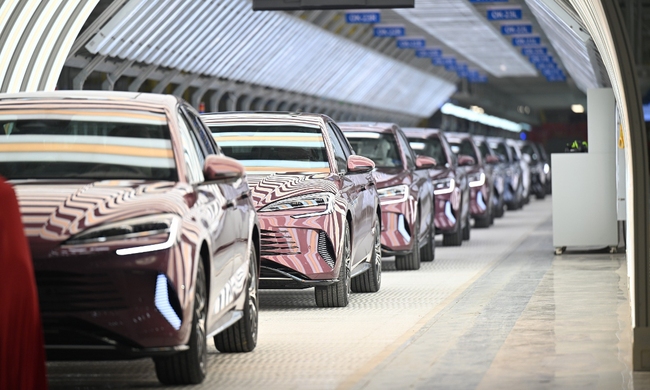(Source:Global Times,2024-07-09)

EV Photo:VCG
Chinese observers on Tuesday blasted an EU official's allegation that China had not sought consultations on the electric vehicle (EV) tariffs until recently despite the EU's attempts to engage for months. The observers said the EU is looking to put more pressure on China to seek better bargaining chips for the ongoing talks, while using the political tactic to deflect from the bloc's internal conflicts.
They said China-EU consultations should be based on equality, urging the EU to show more sincerity to push the ongoing consultations toward a result acceptable to both sides and ensuring win-win China-EU economic and trade relations in the long run.
We have offered consultations to the Chinese government on this case for months, Jorge Toledo, the EU's ambassador to China, said at a conference in Beijing Sunday, Bloomberg reported. It was only nine days ago that European Commission (EC) Executive Vice President Valdis Dombrovskis received a call from China's Commerce Minister Wang Wentao to start consultations, it claimed.
A spokesperson with the Ministry of Commerce (MOFCOM) on Monday night refuted Toledo's allegation, saying that China has been expressing strong opposition on bilateral and multilateral occasions since the EU launched its anti-subsidy probe into Chinese EVs in October 2023.
The spokesperson cited bilateral exchanges on the matter through face-to-face meetings and letters between top leaders and at ministerial levels over the past months.
China has demonstrated its utmost sincerity, said the spokesperson, adding that China hopes that the European side will make joint efforts, demonstrate its sincerity, push forward the consultation process and reach a mutually acceptable solution as soon as possible.
The EU official has disregarded facts when making the groundless allegation, Yang Chengyu, an associate research fellow at the Institute of European Studies of the Chinese Academy of Social Sciences, told the Global Times on Tuesday.
The EC unilaterally announced anti-subsidy investigations into EVs imported from China. This is not a move to seek face-to-face consultations with China for a solution, Yang said.
By making such false allegations, the EU aims to add pressure on China during the consultations to gain better bargaining chips. At the same time, the EU wants to show a hard-line stance toward China to deflect from the bloc's internal conflicts, Jian Junbo, a deputy director of the Center for China-Europe Relations at Fudan University's Institute of International Studies, told the Global Times on Tuesday.
Faced with strong opposition from within the bloc, the EU wants to shirk its responsibility to China if consultations do not go smoothly, Jian said.
The EU move will likely impede the ongoing consultations, he said, noting that any consultation should be based on equality.
Many European politicians and enterprises have recently voiced strong opposition since the EC moved to impose provisional tariffs of up to 37.6 percent on Chinese EV firms. German Vice Chancellor and Federal Minister for Economic Affairs and Climate Protection Robert Habeck has criticized tariffs as being damaging to the economy and consumers, Reuters reported on Monday.
A race via tariffs to protect and cut off economic areas again is wrong, Habeck said, speaking at the inauguration of a battery development center at the Mercedes-Benz headquarters on what it will take to build up a competitive green industry in Europe.
China and the EU on June 22 agreed to launch consultations on the anti-subsidy investigation into Chinese EVs.
The negotiations are challenging and highly complex, but there is hope that they will contribute to easing China-EU economic and trade tensions, while the EU may likely adjust tariffs on Chinese EVs, Jian said.
Yang said that the EU's protectionist actions may have a negative impact on Chinese EV makers and the industry in the short term, but they will not affect the international competitiveness of Chinese products or the EU's growing demand for them.
To address the increasingly fierce economic and trade competition between the two major trade partners, China and the EU should bind their respective industrial chains more closely together and create a bigger pie through mutual integration, Jian said, calling on the EU to avoid vicious competition and unilateral suppression against China.






